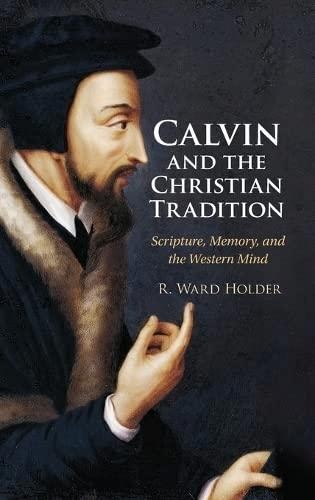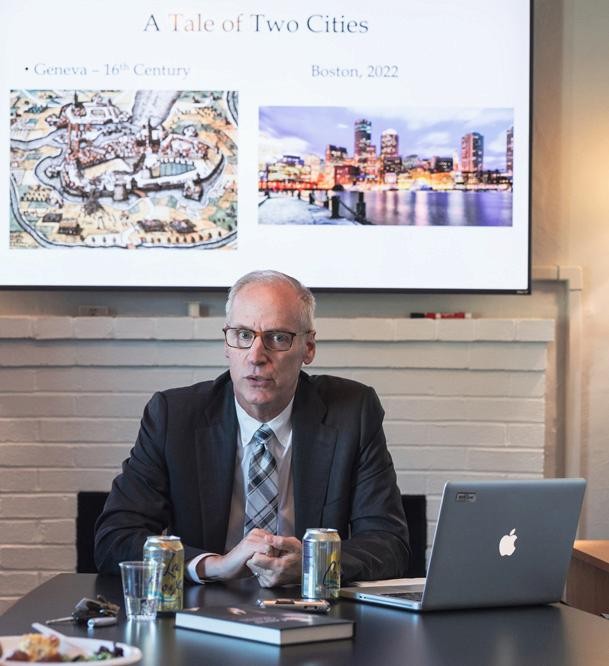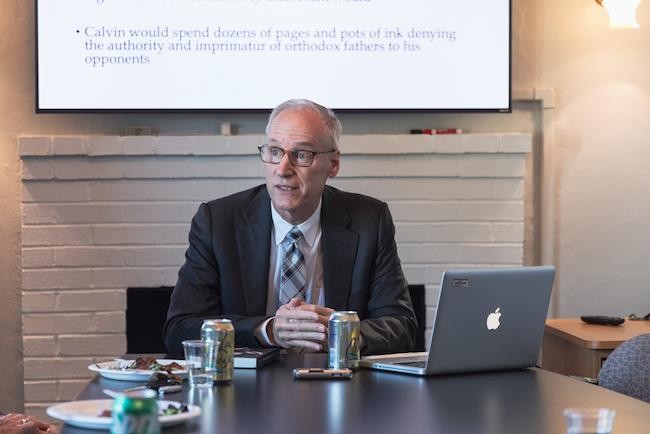Tradition and Its Discontents: John Calvin and the Western Mind

R. Ward Holder
St. Anselm College
Date: Wednesday, November 2, 2022
Time: 12 - 1:15pm
Location: Boisi Center, 24 Quincy Road, Conference Room 101
RSVP: Click this link to sign up for luncheon colloquium. RSVP required for head count to order food.
Abstract
John Calvin strides through the Western imagination as a figure of certainty – willing to abandon the church of his youth, burn a heretic, and proclaim double predestination that consigned millions to damnation. He was certain his doctrine was founded on the Bible alone. His certainties makes him both repugnant and fascinating. But what if our picture of Calvin’s rejection of tradition is wrong? Further, if that is so, what impact does that mistake exercise on Western ideas of the claims of the past, on how moderns construct the meanings of texts, and on modern claims for epistemology?
In Calvin and the Christian Tradition: Scripture, Memory, and the Western Mind, R. Ward Holder makes two intertwined arguments. First, Calvin was wrong about his theological method – which is deeply dependent on tradition. Second, his way of conceiving or self-deceiving the epistemic task has created a tradition in its own manner, one that claims the impenetrable quality of simply depending only on the text. This has influenced not only historiography and theology, but also exegesis and even constitutional interpretation.
Speaker Bio

R. Ward Holder is a historical and political theologian, and professor of theology and politics at Saint Anselm College in Manchester, New Hampshire. He writes on the Reformation, biblical interpretation, and the manner in which religious convictions shape modern politics and political theory. Among his most recent works, he co- authored Reinhold Niebuhr in Theory and Practice: Christian Realism and Democracy in America in the Twenty-First Century, that was published by Lexington Press in 2019, and Calvin and the Christian Tradition: Scripture, Memory, and the Western Mind, with Cambridge University Press in 2022.
Read More
Ehrensperger, Kathy, and R. Ward Holder, eds. Reformation Readings of Romans. (London: T & T Clark, 2008).
Holder, R. Ward, ed. Calvin and Luther: The Continuing Relationship (Göttingen: Vandenhoeck & Ruprecht, 2013).
__________. Crisis and Renewal: The Era of the Reformations. 1st ed. (Louisville, KY: Westminster John Knox Press, 2009).
__________. John Calvin and the Grounding of Interpretation: Calvin's First Commentaries (Leiden: Brill, 2006).
__________, ed. John Calvin in Context (Cambridge: Cambridge University Press, 2019).
__________. “The Reformers and Tradition: Seeing the Roots of the Problem.” Religions 8, no. 6 (2017): 105-15.
__________, ed. The Westminster Handbook to Theologies of the Reformation. 1st ed. (Louisville, KY: Westminster John Knox Press, 2010).
Spierling, Karen E., Erik A. de Boer, and R. Ward Holder, eds. Emancipating Calvin: Culture and Confessional Identity in Francophone Reformed Communities: Essays in Honor of Raymond A. Mentzer, Jr. (Leiden: Brill, 2018).
In the News
In his book, Calvin and the Christian Tradition, R. Ward Holder discusses how analyzing Calvin’s teachings can shed light on modern societal challenges, including political polarization. Similar discussions have been taking place throughout academia, as seen in Ian Speir’s article in Public Discourse: The Journal of the Witherspoon Institute. Similar to Holder, Speir examines how Calvinism influences the American civic order. Specifically, Speir references how the ideology of James Madison, the author of the Federalist Papers, was heavily influenced by Calvinist realism.
Recap
On November 2, the Boisi Center hosted R. Ward Holder, a professor of theology at St. Anselm College who focuses on the early modern period lasting from the fifteenth through the seventeenth century. Holder recently published his third book on Calvin titled, Calvin and the Christian Tradition: Scripture, Memory, and the Western Mind. During his colloquium, “Tradition and its Discontents: John Calvin and the Western Mind,” Holder shared insights from his new book and explored the compatibility of Calvinism and tradition.
Holder began by comparing sixteenth-century Geneva, Switzerland–where Calvin worked as a pastor and reformer–to twenty-first century Boston, Massachusetts. In Geneva, Calvin repudiated the Catholic model of hierarchical religion as well as the Anabaptist and Spiritualist practice of biblical primitivism. Instead, Calvin advocated for a strict following of the scripture. Yet, Holder argued that Calvin incorporated tradition throughout his works. There are several instances in Calvin’s theology that include tradition and bear resemblance to the theology of Orthodox Catholics, despite Calvin’s public renunciation of tradition. For example, Holder referenced how the pure scripture calls for infant baptism; however, in the Protestant practice, baptism only occurs at birth or during teenage years. Similarly, Calvin refutes Joachim Westphal (a Lutheran), arguing about the importance of scripture, yet Calvin dedicates the next twenty pages describing the correct interpretation and application of Augustine. Hence, Holder concluded that Calvin utilizes a functional model of tradition and encourages us, in modern-day Boston, to reconsider the connection between Calvinism and tradition.
Holder transitioned to focusing on the negative implications stemming from the wrongful belief that Calvin strictly relied on tradition. Holder referenced how the modern notion of complementarianism–the belief that men and women have distinct but complementary roles in marriage–is not based in scripture. Holder argued that we need to recognize the presence of tradition in current Calvinist traditions and also be willing to acknowledge that some elements of tradition are wrong, as seen in complementarianism, in order to reform.
An enriching Q&A followed Holder’s presentation, which discussed the influences on Calvin’s focus on plain sense scripture, the possible connections between plain sense scripture and natural law, as well as similarities between biblical literalism and constitutional originalism.



Photo Credits: Christopher Soldt, MTS

